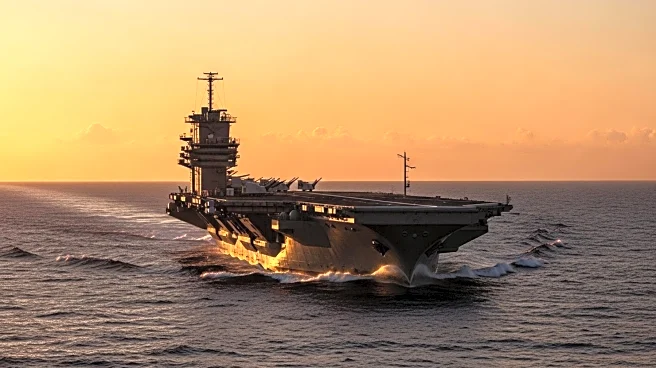What is the story about?
What's Happening?
Satellite imagery has confirmed the presence of two Chinese aircraft carriers, CNS Shandong and CNS Fujian, at the Yulin military complex in Hainan, China. These carriers returned to their home port after evading Typhoon Matmo, which affected southern China. The Yulin complex is a strategic naval hub, featuring a carrier dry dock, deep-water bays, and a ballistic missile submarine base. The CNS Fujian, China's largest and most advanced carrier, is undergoing testing and training in the South China Sea, equipped with an electromagnetic catapult system for launching heavier aircraft. This development is part of China's broader strategy to challenge U.S. military dominance in the Indo-Pacific region.
Why It's Important?
China's military expansion in the South China Sea is significant due to the region's strategic importance, as it is a major conduit for global maritime trade. The presence of advanced aircraft carriers enhances China's ability to project power and influence in the region, potentially altering the balance of military power. This move could impact U.S. interests and its allies, as China seeks to assert its territorial claims despite international rulings against them. The development of the Type 004, a nuclear-powered carrier, further underscores China's ambitions to rival U.S. naval capabilities, posing challenges to regional security dynamics.
What's Next?
The commissioning of the CNS Fujian is anticipated by the end of the year, marking a significant milestone in China's naval capabilities. Additionally, the construction of the Type 004 carrier in Dalian is underway, expected to rival U.S. supercarriers. These advancements may prompt responses from neighboring countries and the U.S., potentially leading to increased military presence or diplomatic efforts to counterbalance China's growing influence. The situation could lead to heightened tensions in the region, necessitating careful monitoring by international stakeholders.
Beyond the Headlines
China's military advancements reflect broader geopolitical shifts, with implications for global security and trade. The strategic positioning of carriers in the South China Sea highlights China's focus on military modernization and regional dominance. This development raises ethical and legal questions regarding territorial claims and the potential for conflict. Long-term, China's actions may influence international maritime law and the balance of power in the Indo-Pacific, affecting global economic and security policies.















